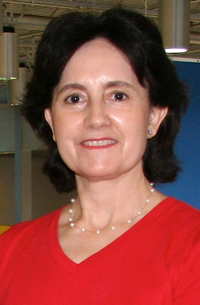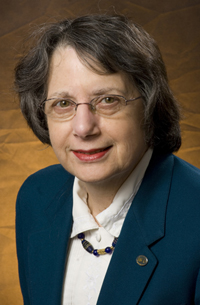Grant aims to advance academic women in chemistry, engineering
Five Florida universities, including The Florida State University, are partners on a professional-development project funded by the National Science Foundation (NSF) that seeks to increase the representation and promote the advancement of women educators in the fields of science, technology, engineering and mathematics — the so-called "STEM" disciplines. The ultimate goal is to contribute to the development of a larger and more diverse science and engineering academic work force.


The NSF's "ADVANCE-PAID" grant will provide a total of $600,000 over three years to the five universities. Collaborating with Florida State are teams from the University of South Florida, the University of Florida, Florida A&M University and Florida International University. USF is the lead university on the grant.
"In practical terms, this grant will provide support and mentoring to women faculty members in all five universities' chemistry and engineering departments," said Penny J. Gilmer, herself a professor of chemistry and biochemistry at Florida State. Gilmer is overseeing her university's portion of the grant, which totals $123,406.
"Specifically, each university plans to offer workshops for senior faculty, department chairs, administrators, and human resource personnel on methods to enhance recruitment of women," she said. "In addition, senior faculty will provide mentoring experiences for junior women faculty in these departments. We also plan workshops on mentoring and monthly meetings with the women faculty in chemistry and engineering to enhance their careers."
Promoting greater diversity in the science and engineering professions isn't simply a matter of providing additional career opportunities for women, although that is certainly important, said Rufina Alamo, a professor of chemical and biomedical engineering at the Florida A&M University-Florida State University College of Engineering and Gilmer's partner on the Florida State portion of the grant.
"Encouraging more women to pursue careers in these fields also helps to create a stronger, more diverse and innovative work force, so everyone benefits," Alamo said. "And at a time when the United States is no longer producing enough scientists and engineers to provide the technological advances upon which our nation's economy has come to depend, we can't afford to continue losing so many talented young women to other professions."
View an abstract of Florida State's portion of the grant here.
Statistics certainly show a continuing disparity between the numbers of men and women pursuing careers in science and engineering. According to the book "Beyond Bias and Barriers: Fulfilling the Potential of Women in Academic Science and Engineering," in 2004 only about 27 percent of doctorates in the physical sciences were awarded to women — and only 18 percent in engineering. Women consistently make up less than 20 percent of tenured STEM faculty at institutions of higher learning.
Collectively, the faculty members and university administrators from all five universities participating in the NSF project comprise the Alliance for the Advancement of Florida's Academic Women in Chemistry and Engineering.
Karen A. Holbrook, the vice president for Research and Innovation at USF, is the principal investigator of the overall NSF grant. She and Kathryn M. Borman, a professor of anthropology at USF, were instrumental in winning the grant for the alliance.
"The ADVANCE-PAID grant is a major step for the collaborating universities in raising the visibility, success and advancement women in the STEM fields," Holbrook said. "Such activities need to begin early in one's education, but at this stage retaining and supporting women in the academic careers is crucial. I suspect we will learn a great deal from them as we work more closely in mentoring roles…and I hope we can engage our female postdoctoral fellows as well."
"Studies show that there is an underrepresentation of women faculty employed in chemistry and engineering academia," said Borman, an expert in educational policy and reform. "As faculty in research institutions, we have a responsibility to increase the visibility of faculty and administrative job opportunities to talented women candidates, and to promote hiring strategies to ensure that qualified women have equal benefit to win prestigious academic positions."
"Encouraging more women to pursue careers in these fields also helps to create a stronger, more diverse and innovative work force, so everyone benefits."
Rufina Alamo
Florida A&M University-Florida State University College of Engineering
